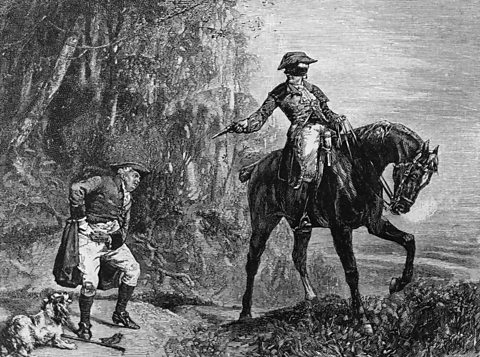Highway robbery in the 18th century

Robbery was a common crime in the 18th century. highway robberyUsing force or the threat of force to steal money or property from travellers on the roads. often happened on the streets and roads approaching London.
A robber on foot was called a footpad and was often part of a gang. They would rob people travelling on foot and they could be very violent.
Highwaymen were robbers on horseback and they usually worked alone or in small groups. They attacked travellers in carriages or on horseback.
Highwaymen increased in number in the early 18th century. They targeted stagecoaches, carriages, farmers returning from market and the mail coaches. Highwaymen were usually armed with pistols and wore masks. They are famous for the phrase, Stand and deliver
. They usually did not have to use force as asking for valuables at gunpoint was enough to make most people hand them over.
Highwaymen are often glamorised in books, poems and films. Indeed, some were certainly courteous to their victims, and it was widely believed at the time that highwaymen tried to ensure that they did not rob from poor people. However, highwaymen could also be bloodthirsty. One highwayman cut out the tongues of his victims so they could not describe him to the Justice of the Peace Someone responsible for maintaining law and order in a county. Often abbreviated to JP..
Dick Turpin
The most famous highwayman was Dick Turpin. Before turning to highway robbery, he was a butcher, who joined a gang of robbers. He stole cattle, burgled houses and stole money from people.
He later turned to highway robbery in Lincolnshire with his partner Tom King. After shooting his partner he fled to Yorkshire and changed his name. In 1739, he was caught and jailed for horse theft in York.
While in prison he wrote to his brother. The handwriting on the letter was recognised by his old teacher, who informed local JPs that they had Dick Turpin in custody. He was hanged in York in 1739.
Dick Turpin was widely glamorised. In a poem written 100 years after his death told of Turpin riding his horse, Black Bess, from London to York in record time to provide himself with an alibi for a crime. Later the poem was turned into a musical and comic books.
Other notable highway robbers
John Rann was a highwayman who was arrested six times for highway robbery but was not convicted. However, in 1774 he robbed a Chaplain and was hanged.
Twm SiГҙn Cati (Thomas Jones) was a Welsh highwayman from the 16th and 17th century. He is known as the Welsh Robin Hood as he allegedly stole from the rich and gave to the poor in Cardiganshire. However, it is likely that not much of what he stole got to the poor.
The end of highway robbery
It declined in the late 18th century mainly due to:
- the Bow Street Horse Patrol actively targeting highwaymen after 1763
- JPs beginning to refuse to licence inns and taverns that provided highwaymen with sanctuary
- continued urbanisation leading to fewer isolated stretches of road
- the development of banking and people carrying less money